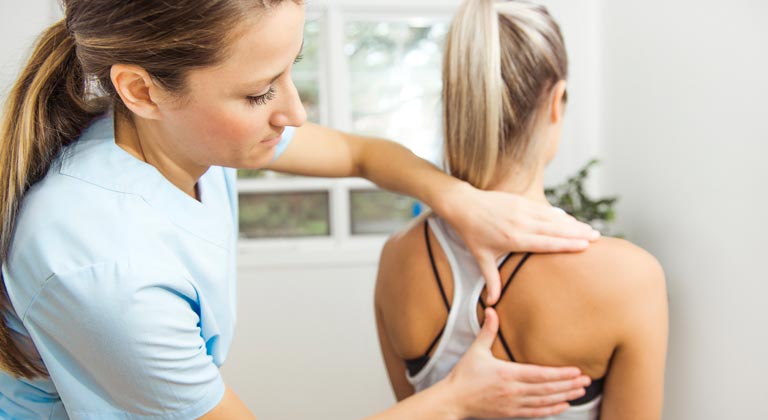M.S. in Exercise Science

A specialized master’s to help you enhance client satisfaction
Learn
Industry Leader Skills
Apply Prescriptive Methods
Receive a Christian Education
Learn More Today
Complete the form to learn more about this program.
- Duration 2 years
- Cost per Credit $475
- Credit Hours 33
Program Benefits
- Study a career-connected curriculum focused on psychology, physiology, ethics, exercise, and more
- Complete a capstone project to synthesize your learning
- Choose an optional graduate study abroad course to gain a global perspective
- Learn from industry-experienced experts
- Now accepting applications – no app fee
- $350 cost per credit for Active-Duty, National Guard & Reserve Service Members and Spouses*
Get the latest science-based research to help others
With a master’s degree in exercise science from CSP Global, you’ll be prepared to advance as a leader in a variety of roles. This flexible online degree is designed to help you build skills in strength and conditioning, coaching, clinical practice, and rehab through a career-connected curriculum built by industry-experienced faculty members. In this program, you’ll dive deep into the latest science-based research and graduate ready to deliver top-tier client outcomes.
Build your professional network by connecting with a cohort of motivated professionals and CSP Global’s top alumni employers. You’ll complete a capstone before graduation to synthesize the practical knowledge gained from coursework and prepare for employment opportunities.

Curriculum
The M.S. in Exercise Science online program is 33 credit hours. You’ll study a career-connected curriculum that explores exercise physiology, clinical exercise assessment, exercise prescription, kinesiology, and ethical perspectives.
CurriculumProgram Outcomes
- Demonstrate advanced knowledge of exercise principles, strength and conditioning concepts, and nutritional influences on the body’s physiological adaptation to exercise.
- Differentiate between various research methodologies and their appropriate use within the exercise science industry.
- Gain the necessary skills to conduct safe exercise testing and create exercise prescriptions focused on health, disease prevention, and chronic disease management.
- Demonstrate knowledge on the application of psychological approaches to working with individuals in an exercise and sport capacity.
- Develop the ability to synthesize scientific-based learning in current exercise science topics and communicate effectively through discussion, written work, and oral presentations.
- Prepare for employment opportunities in the field of exercise science in public, private, and corporate settings.
- Proactively apply knowledge in a real world setting, integrating ethical standards and appreciation of population diversity.
Admissions Requirements
To apply for the online master’s in exercise science from Concordia University, St. Paul, you’ll need:
- A completed online application.
- Submit official transcripts from a regionally accredited institution stating the conferral of a Bachelor’s degree or higher with a minimum cumulative GPA of 3.0 based on a 4.0 system.
- Access to a computer that meets CSP Global’s technology requirements.
Tuition Details
The online M.S. in Exercise Science costs $475 per credit hour, making your total tuition $15,675. Convenient payment options and $2,000 partnership scholarships are available to help you pay for your education.

Military Support and Benefits
Achieve your mission to earn a career-ready degree at CSP Global. In our supportive environment, U.S. military service members and veterans can receive one-on-one guidance for excelling in class and accessing education benefits through the GI Bill® and Yellow Ribbon program. We also offer transfer credit for military service and reduced tuition for active-duty service members and their spouses.
GI Bill® is a registered trademark of the U.S. Department of Veterans Affairs (VA). More information about education benefits offered by VA is available at the official U.S. government web site at http://www.benefits.va.gov/gibill.
The appearance of U.S. Department of Defense (DoD) visual information does not imply or constitute DoD endorsement.
Military ServicesFaculty
At CSP Global, you’ll have support from industry-experienced faculty who will offer guidance and answer your questions throughout your master’s degree online program. It’s yet another way the online format mimics the experience of studying on campus.
With over 25 years of experience and more than 40 online programs, CSP Global is a pioneer in online education. As part of our diverse online community, you’ll receive a liberal arts education guided by Lutheran principles. The career-connected curricula, flexible learning options, and alumni connections available at CSP Global mean you’ll graduate ready for success. We are committed to delivering online programs with the same quality as our on-campus learning.
Online ExperienceCSP Global is committed to initiatives that keep college affordable. In addition to financing your education with federal student aid and private loans, you will be eligible for a tuition discount offered to online students (this limits eligibility for institutional scholarships). Transfer students could receive $2,000 or more through transfer partnerships and transfer student awards. CSP Global is also a Military Friendly® institution. An enrollment counselor can help you apply for financial aid.
Tuition & AidFrequently Asked Questions
Are you interested in one of CSP Global’s programs? Get answers to the most frequently asked questions about time to completion, accreditation, tuition and fees, admissions, and more. If applicable, you can also learn more about licensure, concentrations, or specializations offered in the program. Get more information about any online program or contact an enrollment counselor at (855) 641-2525 with further questions.
The M.S. in Exercise Science includes 33 credit hours.
The M.S. in Exercise Science will have three start dates throughout the year, in January, May, and September.
The online M.S. in Exercise Science from CSP Global is $475 per credit hour.
Disclaimer
*CSP offers a special military tuition rate for Active-Duty, National Guard and Reserve Component Service Members, and current Military spouses of these members. Tuition for the adult undergraduate degree programs are $250 per credit and graduate degree programs are $350 per credit. Service members using this discount are not eligible for the Military Service Scholarship. Proof of status is required.